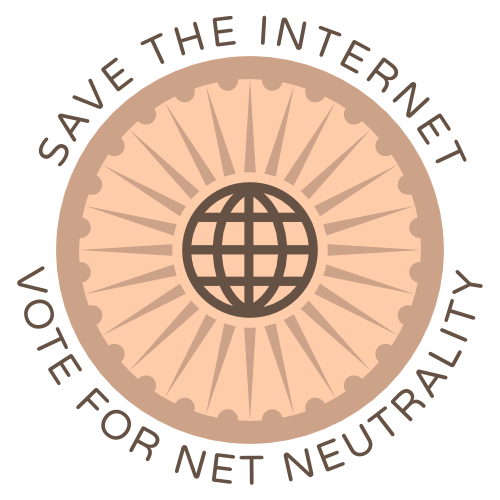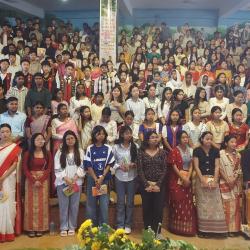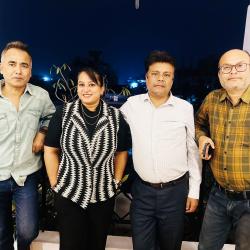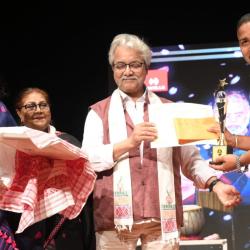TRAI has issued another consultation paper asking once again, if we want Net Neutrality. This time, it's about differential pricing - Airtel Zero and Internet.org type services.
Copy and paste it in your email and send to TRAI.
You will be able to edit before you send.
Emails should be sent to advisorfea1@trai.gov.in
Please bcc us at trai@email.savetheinternet.in
We will try to ensure that your response is acknowledged by TRAI.
----------------------
To,
RS Sharma,
Chairman, TRAI
CC:Vinod Kotwal, Advisor (F&EA), TRAI
Dear Sir,
On the outset, I would request you not to publish my email address on the TRAI website.
I would like to thank the TRAI for introducing the Consultation Paper on Differential Pricing for Data Services. Differential pricing of data is a core Net Neutrality issue. I urge you to protect Net Neutrality, and not allow telecom operators to manipulate how consumers consume content on the Internet by instituting anti-neutrality practices. The principle of Net Neutrality is that ISPs and telecom operators do not give a competitive advantage to any website, app or platform.
I appreciate TRAI’s effort in bringing out an objective and precise consultation paper, highlighting the need for making the Internet available to all - as well as taking into consideration the harms of discriminatory practices. On this I am enclosing specific responses to the queries as sought by the TRAI.
As recently as in April 2015 by using the SaveTheInternet.in platform, more than 12 lakh Indians sent specific responses to the queries raised by the TRAI. A reference to these earlier submissions is necessary given that specific answers to question numbers 14 and 15 in the Consultation Paper on Regulatory Framework for OTT Services were on price discrimination - and provide a valuable gauge of public opinion and expert advice. In order to gain from the previous consultation on OTT Services, I request the TRAI to consider answers from it for the present Consultation Paper on Differential Pricing for Data Services.
I support TRAI in the effort it has taken in this consultation paper, underlined by its determination to take initial steps on advancing net neutrality using its powers to regulate and oversee tariffs so as to protect consumers. Till a comprehensive network neutrality regulation is passed, such measures should be exercised urgently to prevent the repeated efforts to breach these principles by some players in the absence of binding rules. These attempts to some interest to rush ahead despite the ongoing study of these issues by the TRAI and the Government goes against the authority of our democracy.
I endorse the idea of providing “all of the Internet, to all of the people, all of the time”, put forth by the World Wide Web Foundation established by Sir Tim Berners Lee and many other organisations which have been striving to expand connectivity to all without compromising network neutrality. It is my belief that the goals of access and network neutrality are incredibly important for India and the TRAI must further them both rather than falling prey to the falsehood - as sought to be portrayed by some commercial interests - that one is opposed to the other. Furthering meaningful Internet access for all Indians and net neutrality are too important to be put into an untrue binary exchange of this sort.
I would also like to suggest the need for greater clarity on TRAI’s next steps on the larger net neutrality discussions that it originally advanced in its earlier Consultation on OTT Services but not advanced on since May of this year. A firm timetable and clearer consultation process will improve predictability and trust in TRAI as an institution seeking to further the public interest.
I hope the TRAI considers my answers to the present consultation in forming its opinion. In the interim I request that it:
a. Exercises its power to enforce a moratorium on violations of network neutrality till the conclusion of the consultation process;
b. Make clear that in this current consultation on data pricing discrimination it will consider the submissions made by over a million Indians to Question Nos. 14 and 15 in the earlier Consultation on OTT Services (April, 2015); and
c. Announces an actionable time table for the conclusion of both consultation processes.
Question 1: Should the TSPs be allowed to have differential pricing for data usage for accessing different websites, applications or platforms?
Telecom Service Providers should not be allowed to have differential pricing for data usage for accessing different websites, applications or platforms.
* Openness is the biggest strength of the internet. The ease with which people can access and share information on the web has been the force behind the internet’s growth. But price discrimination will break the internet into multiple smaller parts and will unfairly benefit some applications and services that can be accessed at a cheaper price (or for free). The practice of discriminatory pricing will not only impede the growth of internet but it also goes against the agnostic character of the telecom operators, which should be acting as pipes to carry information without discrimination. If telecom operators are allowed to have differential pricing for data usage, it will significantly limit the universe of applications and services that can be accessed by users and strip the internet off diversity, leading to a walled garden.
* Contrary to what is being argued by some telecom operators and certain dominant web services such as Facebook, price discrimination is in fact disadvantageous for customers. Today, consumers are free to access the services and applications they want and are charged the same fee. Research has demonstrated that freedom of choice in information seeking is central to the value of the internet and contributes significantly to knowledge creation for citizens. For price sensitive users, differential pricing will necessarily limit this to a choice between different bouquets of content. As a consequence, the educational and other benefits of “exploring” the internet will be severely diminished. Customers will not be able to discover news services if telecom operators start deciding which services can be made available to the them at a cheaper price and the services which will have high cost of access. That’s because the natural tendency of customers is to gravitate towards cheaper services. Moreover, there is a possibility that differential pricing may result in opaque billing practices among telecom operators, which will eventually lead to unexpected charges. In my opinion, the decision of what services to access should be left to customers and not to the TSPs, which may give false choices their customers by offering certain services at subsidized rates.
* India’s vibrant startup ecosystem also stands to lose if discriminatory pricing is permitted. Internet provides a level playing for all irrespective of whether it is a billion-dollar company or a fledgling startup — the best product will find customers. But by allowing differential pricing, companies that flushed with money can strike deals with internet service providers to make access to their services cheap or can block access to their competitors. This will eventually lead most small startups to shut down. As it is obvious, differential pricing runs counter to Prime Minister Narendra Modi’s Digital India program.
* Telecom operators have seen tremendous growth in data usage on their networks in recent years. The top four telecom operators in the country together registered an annual increase of 65% and 10% for the quarter ending September 2015 in their data usage, as per a report by MediaNama. This rapid growth in usage is also resulting in higher revenues and profits for telecom operators. Therefore, differential pricing has no commercial justification as there is no evidence that the increase in data usage is hurting the financial position of the TSPs in the country. Spectrum is a public utility and telecom operators should not be allowed use it to advance their business interests.
Question 2: If differential pricing for data usage is permitted, what measures should be adopted to ensure that the principles of non- discrimination, transparency, affordable internet access, competition and market entry and innovation are addressed?
Telecom operators will begin acting as gatekeepers of content if differential pricing is permitted. Once that happens, non-discrimination, transparency, affordable internet access, competition and market cannot be achieved.
* There is a big risk of unclear non-discrimination standards among content providers resulting because of differential pricing. It will also increase the probability of litigation. Smaller companies will find it extremely difficult to negotiate and will be excluded. Further, there are significant costs and delays involved in assessing behaviour on a case-by-case basis. Therefore, I propose the regulator should formulate strong rules that prohibit differential pricing.
* In a system with differential pricing, transparency will not be helpful neither for customers nor for application providers. Even if tariff plans are published online with regulatory approval, it is the telecom operators which decides what plans should be offered to the customers. As a result, users cannot choose freely among different applications and services and they will be forced to pick from the plans offered by the telecom operator. The problem will be even more acute for users who do not have the ability to switch to another broadband and data service providers. Additionally, transparency will be of little help to smaller startups and content providers, which will be unable to strike deals with TSPs and will be excluded from such plans.
* There are many ways to make internet access affordable without violating the principles of net neutrality. Many telecom operators and Facebook, through its Internet.org/Free Basics program, are voicing their support for zero-rating, arguing that it is a major step forward in bringing people online. However, they have shown no inclination to study the alternatives which expand internet access upholding net neutrality principles, and have completely ignored the efforts of various organizations doing it.
Question 3: Are there alternative methods/technologies/business models, other than differentiated tariff plans, available to achieve the objective of providing free internet access to the consumers? If yes, please suggest/describe these methods/technologies/business models. Also, describe the potential benefits and disadvantages associated with such methods/technologies/business models?
Yes, several alternatives exist other than differentiated tariff plans or zero rated services that are practical to implement and will provide access to the Internet to millions of Indians who cannot afford it due the costs of data.
a) At the very outset it must be remembered that improving access is public priority - and not one only to be left to some global private corporations. Private corporations cannot guarantee the neutrality and impartiality in exercising such a core government function and will only cite interests of access for furthering their own commercial profits. This will come at the cost of accountability which is at the core of any government process. Many experts have highlighted that access can be improved by the government through, “equal rated” plans that are deployed by the Government. This may be through deployment of the USO fund and creation of a national fiber optic network.
b) The World Wide Web foundation has suggested several alternatives for furthering access without compromising network neutrality which include a free allowance of mobile data for each citizen funded through an universal service fund. Further, TSPs can also offer 2G data services which are capped at 10/20 MB a month which would not violate any forms of network neutrality. Such measures would improve access and give millions of Indians access to the Internet, not some stripped down, wall garden in which content options are determined for them.
c) Further models exist and have been highlighted by entities such as the Mozilla Corporation and others. These are in the forms of, “equal rated” plans and are even being deployed in some countries. Some examples of it include:
“Could the private sector organize itself to provide a baseline “equal rating” for some amount of data necessary for modern life at discounted or no charge? Such a program would integrate the “version 1” private solution of limited access with the citizen demands for the opportunity and full inclusion of the full Open Internet. Perhaps those companies paying for the equal rating might get a “brought to you by” attribution that could bring brand value and network effects. Orange and Mozilla are experimenting with this sort of model in multiple African African and Middle Eastern markets, where users purchasing a $40 (USD) Klif phone receive unlimited talk, text, and 500 MB a month for 6 months.
Another possible way of “equal-rating” content so it is free-of-charge to the user is a model where people watch ads in order to access other sites. Mozilla has been exploring this model in a partnership with Grameenphone (owned by Telenor) in Bangladesh, where users can receive 20MB of unrestricted data per day after watching a short ad in the phone’s marketplace.”
Some TSPs and Facebook have incorrectly framed a debate around access at the cost of network neutrality to further their commercial interests. As it is evident from the above models access does not come at the price of network neutrality.
Question 4: Is there any other issue that should be considered in the present consultation on differential pricing for data services?
I hope the TRAI considers my answers to the present consultation in forming its opinion. These are my informed views, which have been articulated by policy experts furthering my belief in network neutrality. As stated before some TSPs and Facebook have rolled out services and extended them during the midst of the present consultations, backed by large marketing and advertising budgets. Facebook has even used its own platform to push Facebook users to market their lobbying response to the present consultation with ambiguous phrasing. Some users who are using this form have been misled into believing they are supporting net neutrality. This is different from a person independently going on a website, filling in their name and email address and sending a response. The key difference here is user choice. This is the same user choice which is absent in Free Basics or any other zero rated service.
TRAI must be advance on creating comprehensive net neutrality provisions in India, working with the Government in moving forward on the path here. In the interim, the aggressive push by several TSPs and Facebook in launching and expanding zero rated services is undermining the present consultation. I request that the TRAI look into this urgently and in the interim proposes the following measures.
1. Exercises its jurisdiction to issue a moratorium on violations of network neutrality till the conclusion of the consultation process;
2. Considers the submissions made to Question Nos. 14 and 15 in the Consultation on OTT Services (April, 2015) for the Consultation on Pricing Discrimination; and
3. Announces an actionable time table for the conclusion of both consultation processes.








Add new comment